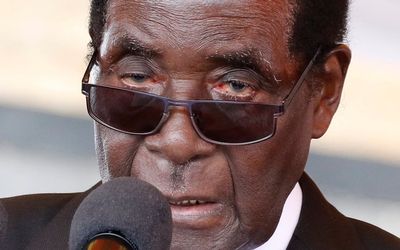PBS: Escaping Eritrea … [Read More...] about ካብ ውሽጢ ቤት ማእሰርታት ኤርትራ
EDITORIAL: Zim’s ticking time bomb
LIKE the proverbial frog in slowly boiling water, South Africans have become inured to the travails of Zimbabwe. Africa’s postcolonial governments followed a variety of paths, but it was Zimbabwe’s awful luck that its leaders harked not to a notion of western democracy, or even Soviet communism, but to a mixture of Chinese and North Korean authoritarianism.

When President Robert Mugabe visited Pyongyang, North Korea, in 1980, he came back, in his own words, “a different man”. What Mugabe admired most was Kim Il-sung’s absolute power and the apparent adoration of North Korea’s people for the “eternal president”. In a strange twist of history, Mugabe, it turns out, has become even more eternal than Kim.
Zanu’s ultimate victory over its liberation competitor Zapu set Zimbabwe on the unusual course of becoming an odd, quasi-democratic mutation of North Korean absolutism. The result is a country fiercely proud of its integrity, but also intensely defensive of its self-inflicted economic disaster.
For a time, ordinary Zimbabweans hoped they could use contradictions within the political system to force change. They did so with the silent acquiescence of the South African government, which was caught in the double-bind of wanting change, but not wanting to be seen to be wanting change for fear of retarding that change.
That strategy hugely underestimated the Zimbabwean elite’s commitment to staying in power, and after a series of false starts, it ended in failure.
The alternative hope was that somehow the disaster that befell the economic system would, on its own, generate change. That too underestimated the brute desire of the Zimbabwean elite to cling to power.
In fact, the hyperinflation crisis may well have retarded change: firstly, by forcing almost the entire Zimbabwean middle class to emigrate; and secondly, by making those who remained even more dependent on the state.
The hyperinflation crisis has had one unintended consequence. Hyperinflation was caused by a government desperate to shore up its failing economy by pumping cash into the economic system. Eventually, it became a self-defeating process when the value of the currency dwindled to nothing. That forced Zimbabwe to relinquish control over its own economic system by adopting the rand and the dollar as legal tender. This decision solved the legal tender problem, and brought a moment of seeming stability. But it introduced a new problem: it removed the ability of the Zimbabwean state to boost the economy by allowing the currency to depreciate.
READ THIS: This time the uprising in Zimbabwe is different – but will it bring regime change?
Now, we are at a pretty pass. Mugabe’s advanced age but continuing presence means the political system is sclerotic. To make it worse, there is a fierce battle taking place over who will be his successor. Meanwhile, the political opposition is fractured — and fracturing further.
For a time, it seemed that one way out would be for Zimbabwe to accept IMF intervention, but intervention comes, as it always does, with conditions that amount to a stipulation that the Zimbabwean government shouldn’t be economically imbecilic. This apparently was too stringent a stipulation, so that door is now closed.
Acts of increasing desperation have been the result. First, the Zimbabwean government suddenly imposed restrictions on a whole range of imports from SA, infuriating Trade and Industry Minister Rob Davies, since he thought talks were still under way.
The reason for this drastic action is that the country has run out of money, causing a second problem — a decision to not pay public servants.
And where, one may ask, is the South African government in all of this? The answer is just nowhere. SA now has a time-bomb ticking on its border with no bomb-disposal unit in sight.
